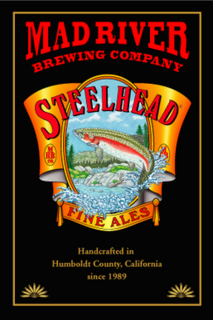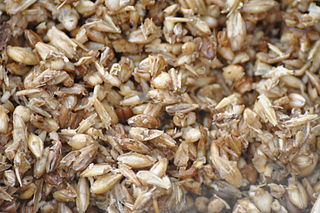Related Research Articles

Beer is one of the oldest and most widely consumed alcoholic drinks in the world, and the third most popular drink overall after water and tea. Beer is brewed from cereal grains—most commonly from malted barley, though wheat, maize (corn), and rice are also used. During the brewing process, fermentation of the starch sugars in the wort produces ethanol and carbonation in the resulting beer. Most modern beer is brewed with hops, which add bitterness and other flavours and act as a natural preservative and stabilizing agent. Other flavouring agents such as gruit, herbs, or fruits may be included or used instead of hops. In commercial brewing, the natural carbonation effect is often removed during processing and replaced with forced carbonation.

Shepherd Neame is an English independent brewery which has been based in the market town of Faversham, Kent, for over 300 years. While 1698 is the brewery's official established date, town records show that commercial brewing has occurred on the site since 1573. Since the brewery’s formation back in the 16th century, ownership has passed in unbroken succession through five families. The brewery produces a range of cask ales and filtered beers. Production is around 180,000 brewers' barrels a year. It has 320 pubs and hotels in South East England, predominantly in Kent and London. The company exports to 44 countries including India, Sweden, Italy, Brazil and Canada.

The Reinheitsgebot is a series of regulations limiting the ingredients in beer in Germany and the states of the former Holy Roman Empire. The best known version of the law was adopted in Bavaria in 1516, but similar regulations predate the Bavarian order, and modern regulations also significantly differ from the 1516 Bavarian version.

A craft brewery or microbrewery is a brewery that produces small amounts of beer, typically less than large breweries, and is often independently owned. Such breweries are generally perceived and marketed as having an emphasis on enthusiasm, new flavors, and varied brewing techniques.

Beer in England has been brewed for hundreds of years. As a beer brewing country, England is known for its top fermented cask beer which finishes maturing in the cellar of the pub rather than at the brewery and is served with only natural carbonation.

Beer in the United States is manufactured by more than 7,000 breweries, which range in size from industry giants to brew pubs and microbreweries. The United States produced 196 million barrels (23.0 GL) of beer in 2012, and consumes roughly 28 US gallons (110 L) of beer per capita annually. In 2011, the United States was ranked fifteenth in the world in per capita consumption, while total consumption was second only to China.
Gluten-free beer is beer made from ingredients that do not contain gluten such as millet, rice, sorghum, buckwheat or corn (maize). People who have gluten intolerance have a reaction to certain proteins in the grains commonly used to make beer, barley and wheat. The hordein found in barley and the gliadin found in wheat are types of gluten that can trigger symptoms in sufferers of these diseases. Gluten-free beer is part of a gluten-free diet.

Mad River Brewing Company is a brewery established in 1989 and located in Blue Lake, California, known for its green production processes.

Anderson Valley Brewing Company is a brewery founded in 1987 in Boonville, California. Its name is derived from its Anderson Valley location in Mendocino County.

Great Lakes Brewing Company is a brewery and brewpub in Cleveland, Ohio. The first brewpub and microbrewery in the state, Great Lakes Brewing has been noted as important to Cleveland's local identity and as one of the initial forces behind the revival of the Ohio City neighborhood on the near West Side. In 2015, it was the 21st-largest craft brewery by volume and the 28th-largest overall brewery in the United States. The company was established in 1988 by brothers Patrick and Daniel Conway, both St. Edward High School graduates, in Cleveland's Ohio City neighborhood, located near St. Ignatius High School and the West Side Market. The brewpub and restaurant remain in their original locations, while production has expanded to adjacent properties.
The United States Brewers' Association was a trade organization that existed from 1862 to 1986.

Beer is often made from barley malt, water, hops and yeast and so is often suitable for vegans and vegetarians. Some beer brewers add finings to clarify the beer when racking into a barrel. Finings can include plant-derived products, like Irish moss, or animal-derived products, like isinglass and gelatin.

Canal Street Brewing Co., L.L.C., doing business as Founders Brewing Company, is a brewery in Grand Rapids, Michigan, known for producing several highly rated and award-winning craft-style ales, including KBS, Centennial IPA, Dirty Bastard, and Founders Porter. Since its founding as a craft brewery in the mid 1990s, it has grown to become the 15th largest brewery in the United States, and a prominent member of the West Michigan brewing industry. It is now majority-owned by Mahou San Miguel of Spain.

Beer has been produced in Scotland for about 5,000 years. The Celtic tradition of using bittering herbs remained in Scotland longer than in the rest of Europe. Most breweries developed in the central Lowlands, which also contained the main centres of population. Edinburgh and Alloa in particular became noted centres for the export of beer around the world. By the end of the 20th century, small breweries had sprung up all over Scotland.

Basil T's Brewery was a brewpub in Red Bank in Monmouth County, New Jersey. In 1987 Victor Rallo Jr., his brother and late father opened and Italian restaurant, then converted into a brewpub 1996. The brewery opened a second location in Toms River in 1997, which was later sold and renamed Artisan's Brewery. The brewery produces 650 barrels of beer per year. In 2014 the owners re-opened as Birravino.

Great Basin Brewing Co. is a brewery headquartered in Sparks, Nevada. It is Nevada's largest and oldest currently operating brewery—though not the state's longest operated. Great Basin beers are available as draught beer and in bottles at over 400 locations in Northern Nevada and the surrounding regions, including Aces Ballpark. They also serve beer at many special events, such as the Best in the West Nugget Rib Cook-off and The Great Reno Balloon Race. Growlers and kegs may be purchased or filled at any of the company's tap rooms.

Dragonmead is a U.S. microbrewery, meadery and brewpub founded by Earl Scherbarth, Larry Channell, and Bill Wrobel in January 1997. The small brewery produces many varieties of beer, wine, and mead, and has received awards including gold medals at the World Beer Cup.

Craft beer tourism refers to tourism where the primary motivation of travel is to visit a brewery, beer festival, beer related activity or other event that allows attendees to experience all aspects of the craft beer-making, consuming and purchasing process. Travel and tourism constitute one of the largest industries in the world, with Americans spending a total of $1.1 trillion in domestic and international travel in 2018. The beer tourism industry has evolved from the larger culinary and beverage tourism category in which people began planning travels based around experiencing food and drink of different geographies. Informally, vacations centric to the theme of enjoying beer have been dubbed "beercations".

Brewer's spent grain (BSG) or draff is a food waste that is a byproduct of the brewing industry that makes up 85 percent of brewing waste. BSG is obtained as a mostly solid residue after wort production in the brewing process. The product is initially wet, with a short shelf-life, but can be dried and processed in various ways to preserve it.
References
- ↑ "Find a Brewery".
- ↑ "Spring Beer Festival in Traverse City Canceled". 9 & 10 News. 2020-03-23. Retrieved 2020-04-30.
- Rex Halfpenny. "Michigan Brewers Guild Seeks To Promote Local Beers". Midwest Beer Notes. Retrieved March 1, 2007.